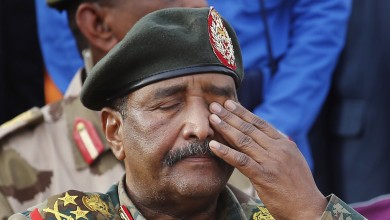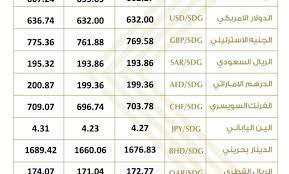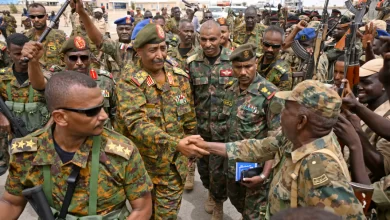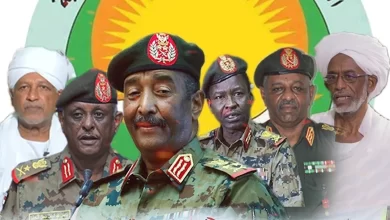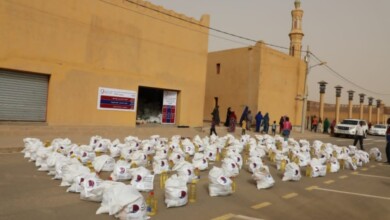Port Sudan stands with Tehran against Israel: Is the world witnessing the birth of another Houthi on the Red Sea?
Al-Burhan reinstated the Islamists, who in turn restored relations with Iran
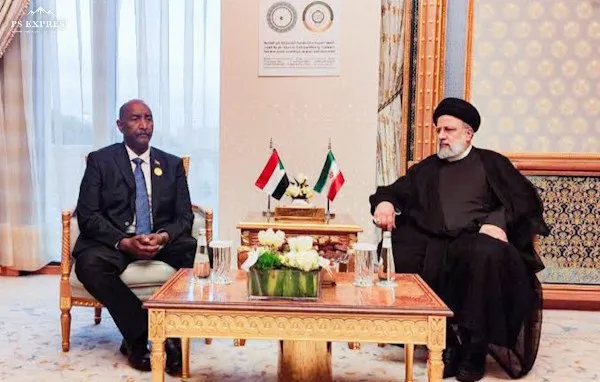
Report: Sudan Gate
An Introduction
Amid the political and diplomatic confusion that coincides with the specter of military collapse of the Army Commander-in-chief Abdel Fattah Al-Burhan’s authority, the Port Sudan Foreign Ministry is moving forward to restore its old relationship with the mullahs’ regime in (Tehran), thus sparking regional and international controversy. Yesterday, the Port Sudan Foreign Ministry, controlled by Islamists, issued a strongly worded official statement condemning the Israeli military attack on Iran yesterday, which came in response to a previous Iranian attack on Israel, describing it as a flagrant violation of Iran’s Sovereignty and a threat to regional and international security. This statement reflects the extent of political, security and military coordination between Port Sudan and Tehran after the resumption of relations between them in October (2023), following an eight-year hiatus.
Resumption of Sudanese-Iranian Relations
The visit of Ali Al-Sadig, the Foreign Minister of Al-Burhan’s government in Port Sudan, to Iran last February, signaled the return of relations, where he pointed out the importance of restoring the “longstanding” relations between the two countries. The Iranian President at the time, Ebrahim Raisi, considered it a step to create new opportunities and compensate for lost opportunities.
In July (2023), ambassadors were exchanged between the two countries, where Al-Burhan received the Iranian Ambassador Hassan Shah Hosseini, while Tehran accredited Abdul Aziz Hassan Saleh as the ambassador for Port Sudan, thus inaugurating a new phase of diplomatic relations.
Motives behind the Iranian-Sudanese Alliance
Observers believe that Iran seeks to strengthen its influence in the African continent through Sudan, due to its strategic location overlooking the Red Sea, which is a pivotal location in light of the presence of its allies, such as the Houthi group that poses a threat to international navigation in the Red Sea.
It seems that Al-Burhan is counting on this rapprochement as part of his quest to obtain military support, especially with the intensification of domestic conflict. While analysts believe that Al-Burhan’s government, supported by elements of the former Islamist regime, is committed to distancing its relations with Israel as an Iranian condition for restoring relations and providing military support.
Military Cooperation between Sudan and Iran
Military cooperation between the two countries has restored momentum to bilateral relations after their resumption, as Iran sent at least nine cargo flights from Tehran to Port Sudan during the period from December (2023) to July (2024), via the “Qeshm Fars Airlines” company, which is owned by forces affiliated with the (Iranian Revolutionary Guard) and subject to US sanctions.
These shipments included “Mohajer-6” drones, ground control stations, artillery, and other military equipment. These shipments were received prior to a military campaign launched by Al-Burhan’s Army in early (2024), invoking questions in regards to the role of Iran and its weapons in this devastating war.
International Reactions
Last week, the US government imposed sanctions on the Director of the Defense Industries System (DIS), Lt. Gen. Mirghani Idris, known to be directly responsible for financing and arming the Sudanese Army during the war and is one of the close associates of the Army Commander-in-Chief Abdel Fattah al-Burhan. The US State Department confirmed last Thursday that the Sudanese Army has prioritized purchasing drones from Iran and Russia, instead of seeking peace.
A political analyst considered the US State Department’s comment on the Sudanese Army’s quest to purchase drones from Russia and Iran, in addition to imposing sanctions on influential figures close to Al-Burhan; to be an indication that the US government is fed up with Al-Burhan’s policies and his constant evasion of peaceful solutions as well as his alignment with the war camp led by Russia and Iran.
Repercussions of War and Displacement in Sudan
Since the outbreak of the war between the Army led by Abdel Fattah al-Burhan and the Rapid Support Forces led by Mohamed Hamdan Daglo “Hemedti” in April (2023), a war that numerous evidences indicate the role the Islamists played in igniting.
Sudan is witnessing an ongoing conflict that has resulted in the deaths of more than (100,000) people according to United Nations statistics, and the displacement of approximately (11.3) million people, a third of whom have sought refuge in neighboring countries. The United Nations has described the Sudanese crisis as ‘the largest internal displacement crisis’ and ‘the largest child displacement crisis’, with the number of displaced children exceeding (3) million children inside and outside Sudan. Famine also threatens about (26) million Sudanese, with a state of famine declared in some areas of Darfur, which represents a major humanitarian disaster at the global level.
In Conclusion
The new old alliance between Port Sudan and Tehran under the leadership of Abdel Fattah Al-Burhan reflects a strategic shift that has regional and international implications, especially in light of the internal conflict and crises Sudan is facing.
This rapprochement not only contributes to the continuation of the war and thus exacerbates the severe humanitarian crisis, but it also raises regional and international concerns about the threat to the security of the Red Sea and international navigation. While the Sudanese suffer from the repercussions of the internal conflict and famine, the future remains dependent on the developments of this new alliance and its effects on regional stability as well as the threat to international peace and security. In addition to the role of the international community in stopping the war and providing urgent assistance to save the Sudanese.

